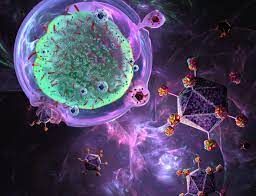- Home
- About Us
- Industry
- Services
- Reading
- Contact Us
Global CAR T-Cell Therapy Market is Expected to Foresee Significant Growth During the Forecast Period. North America to Witness the Highest Growth
Author: Vikas Kumar
April 28, 2022

Global CAR T-cell therapy market is expected to grow significantly by 2027 expanding at a reasonable CAGR during the forecast period (2021-2027). CAR T-Cell Therapy is a type of immunotherapy that is regarded as s revolutionary therapy for cancer. In this therapy, the T-cells are taken from the patient’s blood and are modified in the laboratory for attacking the cancer cells. CAR T-cell therapy is most commonly used to treat certain blood cancers and is being studied for the treatment of other cancer types.
For a detailed analysis of the CAR T-cell therapy browse through https://univdatos.com/report/car-t-cell-therapy-market/
The global CAR T-Cell Therapy market is anticipated to witness an uptick with the development of social society leading to changes in diet and other lifestyles. This along with the rapidly growing aging population across the globe is causing an increase in the number of patients having lymphoma, leukemia, and myeloma. For instance, in the United States, around 1 person is diagnosed with a type of blood cancer every 3 minutes, as per the Leukemia & Lymphoma Society. Also, in 2019, leukemia, myeloma and lymphoma were predicted to account for almost 10% of the total new cancer cases. Furthermore, the continuous technological advancement for reliable and effective cancer treatment, a growing number of clinical studies in cell therapy, and promulgating strategic alliances to facilitate more innovative research and development activities are some of the factors contributing to the growth of the CAR T-cell therapy market globally.
For a detailed analysis of the market drivers of CAR T-cell therapy browse through https://univdatos.com/get-a-free-sample-form-php/?product_id=19670
Based on product, the market is segmented into abecma, breyanzi, kymriah, tecartus, and yescarta. The yescarta segment grabbed an XX% share of the global CAR T-cell therapy market and will witness a considerable CAGR of XX% during the forecast period (2021-2027F). Yescarta is the first CAR T-cell therapy that has been approved for certain types of non-Hodgkin lymphoma (NHL). The growth of this segment can be attributed to the customization of each dose of yescarta as the treatment is created by using a patient’s immune system to help fight the lymphoma.
Based on the indication, the global CAR T-cell therapy market is segmented into relapsed Large B-cell Lymphoma, Acute Lymphoblastic Leukemia (ALL), and Multiple Myeloma. The relapsed Large B-cell Lymphoma disease segment occupied a substantial share and is expected to grow at a CAGR of XX% during the forecast period 2021-2027 owing to the the growing incidences of relapsed large b-cell lymphoma and the increase in FDA approval of CAR T-cell therapy for the same.
Request for Sample of the report browse through https://univdatos.com/get-a-free-sample-form-php/?product_id=19670
Additionally, the report provides detailed report also provides insights into the global CAR T-cell therapy market according to the regions such as North America (United States, Canada, and the Rest of North America), Europe (Germany, France, Italy, Spain, United Kingdom, and Rest of Europe), Asia-Pacific (China, India, Australia, Japan, and Rest of APAC), Rest of World has been conducted. North America dominated the market and generated revenue of USD XX billion in 2020 owing to the well-established market players and increasing geriatric population.
Novartis AG, Gilead Sciences, Inc., Amgen, Inc., Juno Therapeutics, Eli Lilly and Company, Sorrento Therapeutics, Fate Therapeutics, Inc., Johnson & Johnson, Celgene Corporation, Bluebird bio, Inc., are some of the key players operating in the global CAR T-cell therapy market. Several M&As along with partnerships have been undertaken by these players to develop new products.
Global CAR T-Cell Therapy Market Segmentation
Market Insight, by Product
- Abecma
- Breyanzi
- Kymriah
- Tecartus
- Yescarta
Market Insight, by Indication
- Relapsed Large B-cell Lymphoma
- Acute Lymphoblastic Leukemia (ALL)
- Multiple Myeloma
Market Insight, by End-Users
- Hospitals
- Cancer Treatments Centers
- Others
Market Insight, by Region
- North America
- United States
- Canada
- Rest of North America
- Europe
- France
- Germany
- Italy
- Spain
- United Kingdom
- Rest of Europe
- Asia-Pacific
- China
- India
- Australia
- Japan
- Rest of Asia-Pacific
- Rest of World
Top Company Profiles
- Novartis AG
- Gilead Sciences, Inc.
- Amgen, Inc.
- Juno Therapeutics
- Eli Lilly and Company
- Sorrento Therapeutics
- Fate Therapeutics, Inc.
- Johnson & Johnson
- Celgene Corporation
- Bluebird bio, Inc.
Get a Callback
